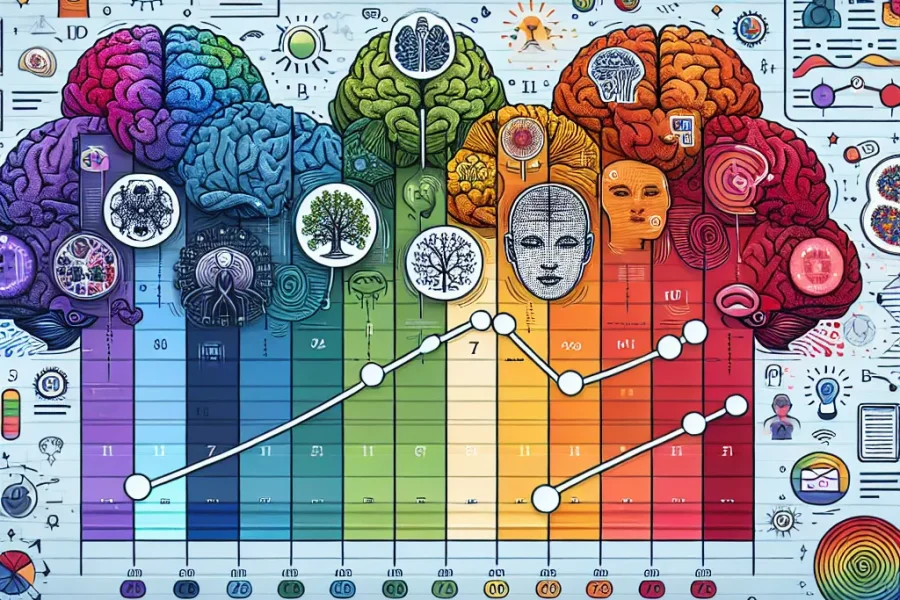Emotional Intelligence (EI) has emerged as one of the most crucial skill sets for success in the 2020s, particularly as workplace dynamics and interpersonal relationships become increasingly complex in our digital age. Research from leading institutions, including Harvard Business School and the World Economic Forum, continues to highlight EI as a top skill for future workforce success. As organizations prioritize emotional intelligence in hiring and development processes, the need for accurate assessment tools has never been more critical.
If you are looking for an excellent way to get your IQ Score, try our highly accurate IQ Test.
The landscape of emotional intelligence testing has evolved significantly, with artificial intelligence and machine learning now complementing traditional assessment methods. Modern tests range from sophisticated self-report questionnaires to AI-powered behavioral analysis tools. However, amidst these technological advances, the Mayer-Salovey-Caruso Emotional Intelligence Test (MSCEIT) remains the gold standard for measuring emotional intelligence, particularly in professional settings.
The MSCEIT, developed by renowned researchers John Mayer, Peter Salovey, and David Caruso, builds upon their groundbreaking four-branch model of emotional intelligence. This scientific approach defines EI as a set of interrelated abilities: emotion perception, emotional facilitation of thought, emotional understanding, and emotion management. Unlike subjective self-assessment tools, the MSCEIT employs an ability-based methodology that measures actual emotional intelligence performance through carefully designed scenarios and tasks.
The test’s structure comprises four distinct sections, each targeting a specific aspect of emotional intelligence. The first evaluates your capacity to recognize emotions in faces, images, and abstract patterns. The second measures how effectively you harness emotions to enhance cognitive processes and decision-making. The third section tests your grasp of emotional complexity and transitions. The fourth assesses your proficiency in emotional regulation and management in various contexts.
Recent validation studies have further solidified the MSCEIT’s position as the most accurate emotional intelligence test available. Its ability-based approach provides objective measurements that correlate strongly with real-world outcomes in leadership effectiveness, team performance, and interpersonal success. The test’s reliability has been demonstrated across different cultures, industries, and organizational levels.
Organizations increasingly utilize the MSCEIT for talent acquisition, leadership development, and team optimization. Recent research indicates that companies implementing MSCEIT-based development programs report significant improvements in employee engagement, conflict resolution, and overall workplace satisfaction. The test’s comprehensive insights enable targeted development strategies that enhance both individual and organizational emotional intelligence.
While the MSCEIT maintains its position as the leading assessment tool, it’s worth acknowledging emerging complementary approaches. New research suggests that combining the MSCEIT with real-time behavioral analytics and contextual assessments can provide an even more comprehensive understanding of emotional intelligence.
The test’s scientific rigor and comprehensive scope make it particularly valuable in today’s rapidly evolving professional landscape. As remote work, cross-cultural teams, and digital communication become increasingly prevalent, the ability to accurately assess and develop emotional intelligence becomes even more crucial.
Modern applications of the MSCEIT extend beyond traditional corporate settings. Educational institutions are incorporating its principles into curriculum development, healthcare providers are using it to enhance patient care, and leadership coaches are leveraging its insights for executive development. The test’s versatility and accuracy make it an invaluable tool across diverse fields.
As we move forward, it’s essential to recognize that emotional intelligence assessment is just one component of a broader development journey. While the MSCEIT provides precise measurements and insights, true emotional intelligence growth requires ongoing practice, reflection, and real-world application. Regular feedback, mindfulness practices, and intentional relationship building remain crucial supplements to formal assessment.
The MSCEIT continues to evolve with our understanding of emotional intelligence, incorporating new research findings and adapting to changing societal needs. Its scientific foundation, combined with its practical applicability, makes it the most reliable tool for measuring emotional intelligence in today’s complex world. Whether used for personal development, professional advancement, or organizational improvement, the MSCEIT provides the detailed insights necessary for enhancing this vital skill set. As we continue to navigate an increasingly interconnected and emotionally demanding world, the ability to accurately assess and develop emotional intelligence remains paramount to personal and professional success.




Leave a Comment